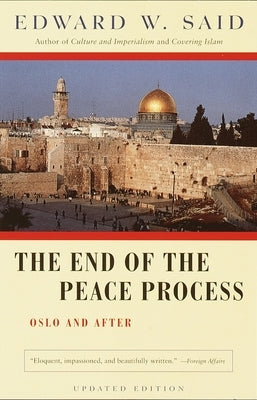Description
Soon after the Oslo accords were signed in September 1993 by Israel and Palestinian Liberation Organization, Edward Said predicted that they could not lead to real peace. In these essays, most written for Arab and European newspapers, Said uncovers the political mechanism that advertises reconciliation in the Middle East while keeping peace out of the picture.
Said argues that the imbalance in power that forces Palestinians and Arab states to accept the concessions of the United States and Israel prohibits real negotiations and promotes the second-class treatment of Palestinians. He documents what has really gone on in the occupied territories since the signing. He reports worsening conditions for the Palestinians critiques Yasir Arafat's self-interested and oppressive leadership, denounces Israel's refusal to recognize Palestine's past, and--in essays new to this edition--addresses the resulting unrest. In this unflinching cry for civic justice and self-determination, Said promotes not a political agenda but a transcendent alternative: the peaceful coexistence of Arabs and Jews enjoying equal rights and shared citizenship.Author: Edward W. Said
Publisher: Vintage
Published: 05/08/2001
Pages: 432
Binding Type: Paperback
Weight: 0.73lbs
Size: 7.94h x 5.18w x 0.92d
ISBN13: 9780375725746
ISBN10: 0375725741
BISAC Categories:
- History | Wars & Conflicts | General
- History | Middle East | General
- Political Science | International Relations | General
About the Author
Edward W. Said was born in 1935 in Jerusalem, raised in Jerusalem and Cairo, and educated in the United States, where he attended Princeton (B.A. 1957) and Harvard (M.A. 1960; Ph.D. 1964). In 1963, he began teaching at Columbia University, where he was University Professor of English and Comparative Literature. He died in 2003 in New York City.
He is the author of twenty-two books which have been translated into 35 languages, including Orientalism (1978); The Question of Palestine (1979); Covering Islam (1980); The World, the Text, and the Critic (1983); Culture and Imperialism (1993); Peace and Its Discontents: Essays on Palestine and the Middle East Peace Process (1996); and Out of Place: A Memoir (1999). Besides his academic work, he wrote a twice-monthly column for Al-Hayat and Al-Ahram; was a regular contributor to newspapers in Europe, Asia, and the Middle East; and was the music critic for The Nation.
